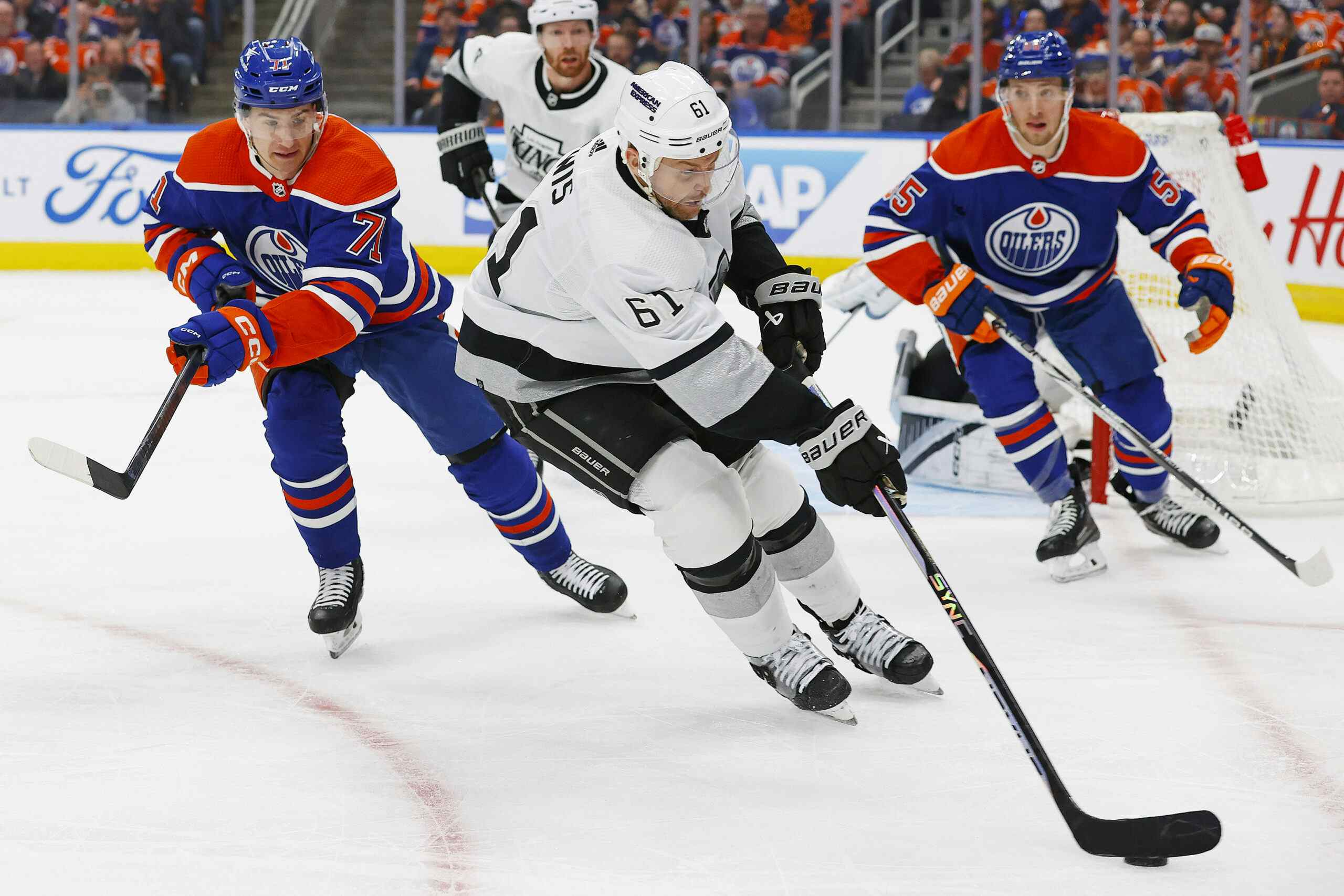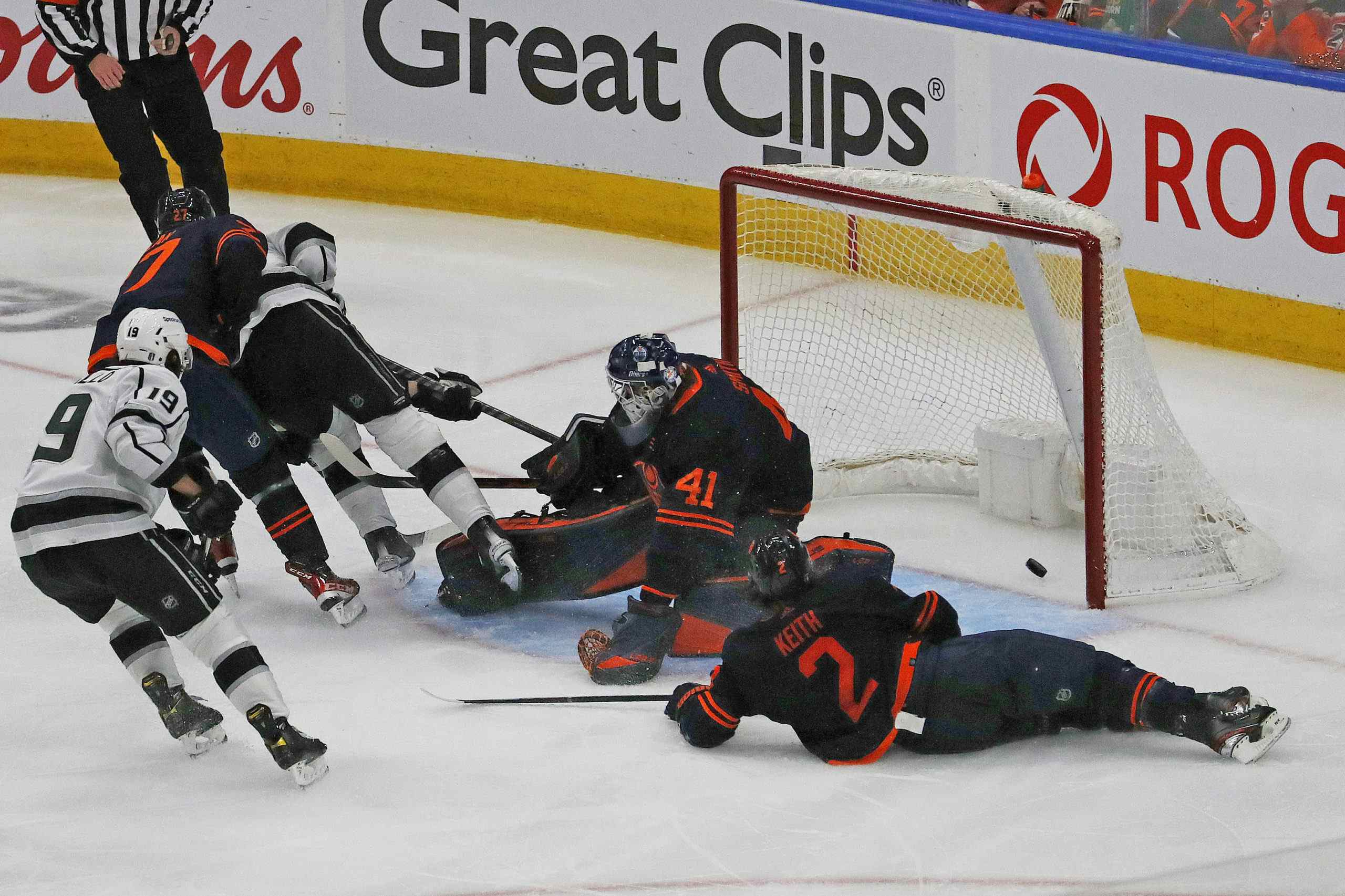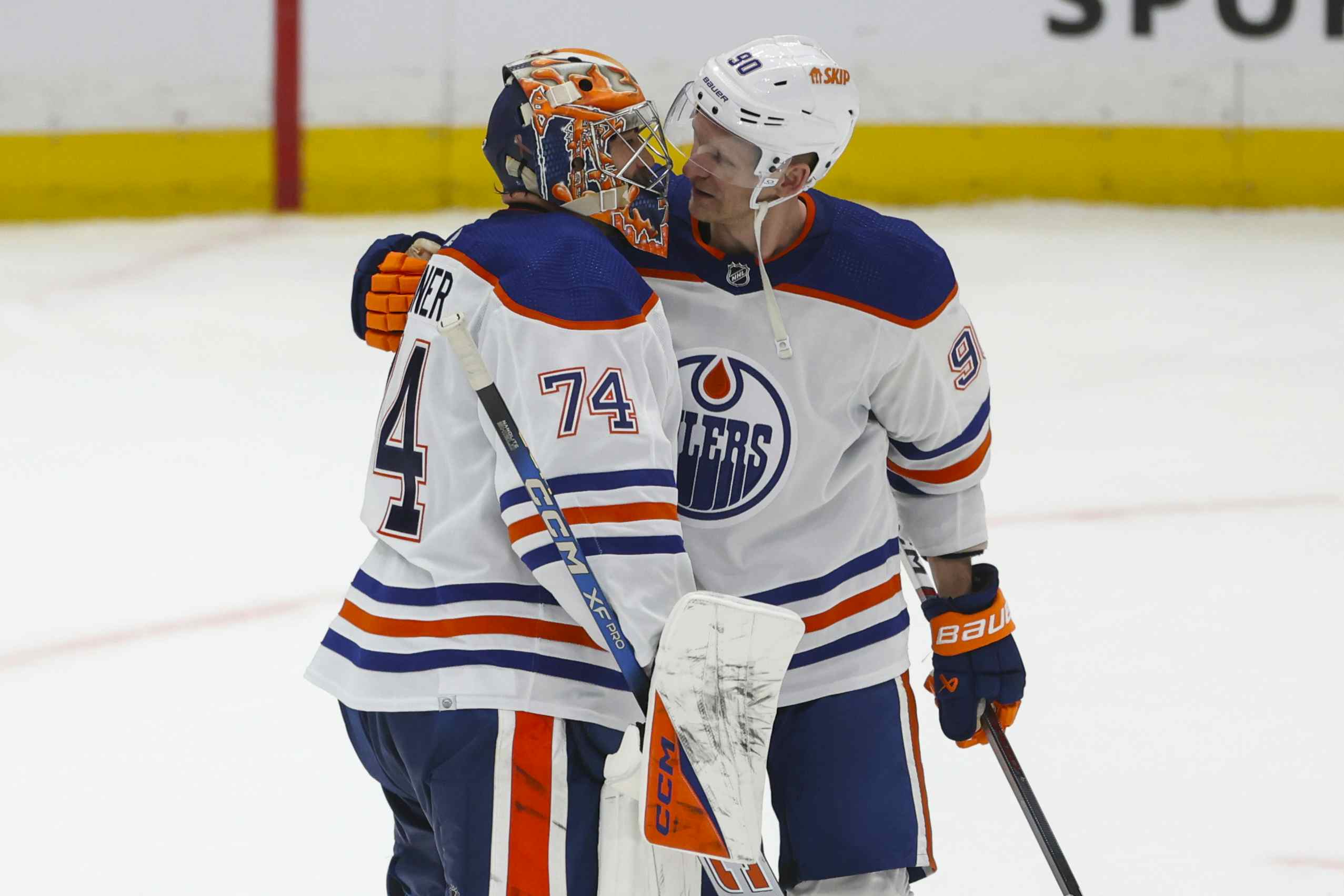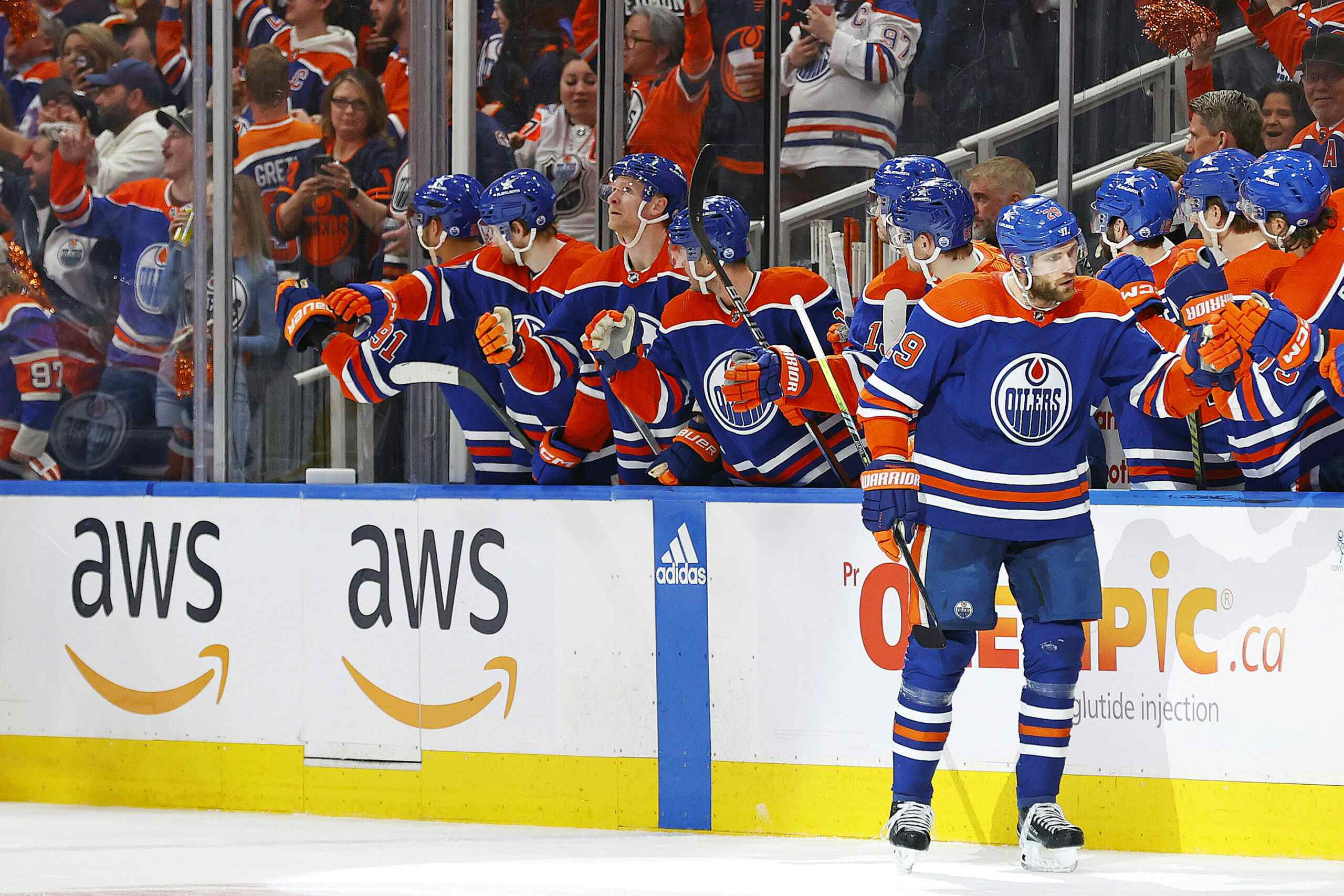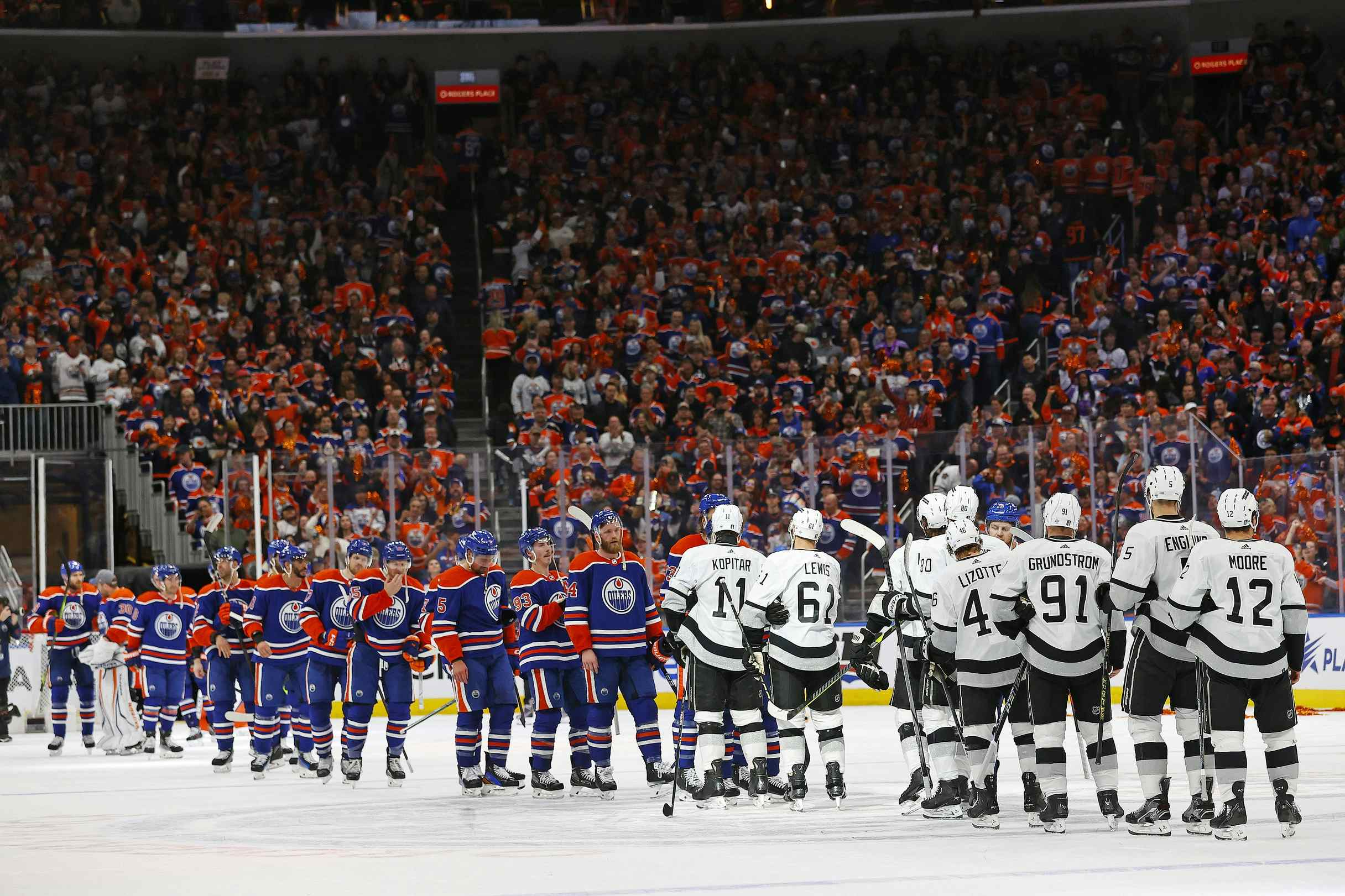Oilers/Stars Postgame: Unlikely Heroes
The setting for tonight’s contest between the Edmonton Oilers and Dallas Stars was not particularly auspicious. The Stars, after enjoying a return to dominance in the West over the early part of the season, have seen their fortunes fall in February and now face the real possibility of losing their playoff spot. Meanwhile the Oilers, into their second season as the NHL’s worst team, were fresh off arguably their worst weekend of the year.
Ominously, the Oilers opted to start Nikolai Khabibulin against the Stars. Khabibulin, owner of a personal 14 game losing streak, had allowed three or more goals a dozen times over that stretch. He started the game awkwardly as the puck came near his net, followed by a Stars forward and Ladislav Smid. Khabibulin left the net to play the puck, and not only failed to clear it but managed to take out Smid in the process.
It was not to last. The Oilers defence bent again and again under the force of a Stars’ onslaught. The Stars managed six shots early on, and four of them were five-star opportunities. Khabibulin was tested in a multitude of ways, and time and again proved equal to the task. In fact, as the first period wore on, Khabibulin alone stood between the Oilers and disaster; he may not be the team’s most valuable player this season but on this night there is no doubt that is precisely what he was.
As a result, it was still a 0-0 game when Andrew Cogliano and Jordan Eberle entered the Stars’ zone late in the first. Cogliano carried the puck and took a long shot, intentionally looking for a rebound; Eberle meanwhile cut off Stars’ defenceman Trevor Daley and took his lane. Though Eberle was unable to knock that rebound past Kari Lehtonen, he did draw a penalty.
The NHL’s worst power play took to the ice, and for the majority of two minutes repeated recent history; there was minimal movement, few chances, and no goal-scoring. Then, as the final seconds in the penalty ticked off, the young trio of Gagner, Eberle and Hall cycled the puck down low. Gagner, stuck behind the net with almost no room, somehow got the puck past a prone penalty-killer, and Jordan Eberle converted the gorgeous pass into a goal a moment after the penalty ended.
The second period, like the first, started with near-disaster. This time it was Sam Gagner, the key factor on Eberle’s goal, playing the role of goat. He, Omark and Paajarvi were caught out against the Mike Ribeiro line and thoroughly outplayed. Trapped on the ice after a failed clearing attempt by Gagner turned into icing, Tom Renney utilized his time out to give them a breather, but a lost faceoff led to more tense moments before the line finally managed to clear the puck and get off the ice. This was the first of three shifts where the Gagner line had its collective show run by Ribeiro & Co. While Renney was willing to help his third line with the timeout, he refused to extend his magnanimity to the point of using his home-ice advantage to generate favourable match-ups; instead he kept rolling the lines and Marc Crawford kept sending out his top guns against Kid Line II.
Yet, even as Renney was outcoached by Crow, two things kept going his way. Nikolai Khabibulin refused to allow a goal, and Taylor Hall took over the game’s second frame, driving hard everywhere on the ice and generating mayhem in the opposition’s zone. As the middle of the period approached, it was Hall who created another power play, courtesy of an iffy hooking call on Mark Fistric.
Twenty-two seconds later Taylor Chorney, fresh out of Oklahoma, would notch the first marker of his NHL career. Chorney had been nothing if not bold early in the game, showcasing both his talent in a series of delightful moves, and his youth in a few ill-advised decisions (skating the puck through three opposing players, setting Jacques up for a beautiful hit with a suicide pass) and some turnovers too. That boldness extended to the man advantage, as Chorney stood in sharp contrast to the static nature of the unit by roaming up and down the right side of the Stars’ zone. Gilbert and Horcoff played give-and-go with the puck at the left point before the Oilers captain threaded the puck through the impotent penalty-killing box; Chorney wasted no time in blasting the puck past Kari Lehtonen.
As even-strength play resumed, so did Hall’s stellar work. Nevertheless, it was Shawn Horcoff who figured into the game’s next big moment; he won a faceoff cleanly but found himself tied up with his opponent and the referees decided to give Dallas their first chance on the man advantage. Newcomer Jason Williams, stepping in for the injured Brad Richards, made the Oilers pay for Horcoff’s infraction; he whipped a pass smartly up the ice to Loui Eriksson who in order shrugged off a lazy stick-check from Dustin Penner, blew by a seemingly inattentive Theo Peckham, and with a slight move opened up Khabibulin’s five hole and deposited the puck between his legs and ultimately into the open goal behind them.
With the Stars down by a single goal, there was certainly potential for an Oilers collapse. Instead, Tom Wandell (who was robbed by Khabibulin early in the game) took a tripping penalty and Shawn Horcoff set about making amends for his earlier minor. As Hemsky did his customary dance with the puck, Horcoff moved into the middle of the Stars’ penalty-killing box, and made no mistake in putting the puck past Lehtonen. This led Stars’ colour man Daryl Reaugh to ask, incredulous, “Who had the Oilers powerplay as the difference?”
Nikolai Khabibulin made yet another huge save as the period died.
The third period had barely begun before the Oilers padded their lead. Tom Gilbert, who had quietly put in a brilliant effort from the blue-line, again gave the puck to Shawn Horcoff. Horcoff in turn made a nice pass to Ales Hemsky, who danced the puck in behind Lehtonen’s outstretched leg to make it a 4-1 game before the first minute had elapsed in the game’s final frame. Both Horcoff and Hemsky almost added another point minutes later, but Jason Williams managed to tie up Horcoff’s stick at the side of the net to prevent a goal.
It was a night to appreciate both veteran forwards. Shawn Horcoff, in his first game back from illness, was excellent. Yet in many ways it was Hemsky, playing perhaps one of his final games in copper and blue colours, who stood out. He played with typical flair, but it was also a night that should silence those who claim him to be a soft player; he took at least four major hits from various Stars and continued to dart in and out of traffic.
The fourth line had a so-so night, and the third period featured a reversal for two players. Ryan Jones had been ineffectual over the first half of the game but showed some nastiness in the third, particularly in the form of two big hits. First, he demanded swift retribution for a hit on Hemsky, laying out the offender. Later, he went from standing still to laying out Brian Sutherby (no easy task even at full tilt) in no time flat. For Jean-Francois Jacques, the reversal went the other direction. While he’d been remarkably effective, particularly on the forecheck, early in the game, Jacques took a gratuitous run at a puckless Toby Petersen, which resulted in a penalty. The penalty-kill put a bullet point on a night of unlikely heroes, showing sustained pressure and rendering the Stars’ ensuing power play powerless.
In many ways the game’s final stanza was a microcosm of the entire evening. Khabibulin continued to play marvellously. Mike Ribeiro’s line trapped inferior Oilers in their own zone, but was unable to turn that territorial command into goals. Ales Hemsky danced. Meanwhile, Hall and Eberle both continued to put in a superb effort. Late in the game, Hall chased the puck into the offensive zone. Blocked by two Stars defenders, he tried to force his way through and when he couldn’t settled for plastering Mark Fistric against the end-boards. Fistric, looking for retribution, cross-checked Hall and ended up in the penalty box, though this time the Oilers power play couldn’t score.
For one night, things went according to plan. Nikolai Khabibulin was the best player on the ice, for either team. The Oilers’ key veterans (minus Dustin Penner, who had an indifferent evening) led by example, while the young players showed flashes and a pair (Hall and Eberle) showed far more than that. Even James Neal’s late run at Linus Omark couldn’t ruin the contest, which ended in a rare victory for the home team.
Recent articles from Jonathan Willis

